If you are a parent, or soon to be a parent, you may already have discovered the US’s Baby Name Voyager. It’s a data-visualization classic, a wonderful way to bring 100 years of American baby names to life. And like (I think) the very best visualizations, it is useful as well as interesting: not only does it reveal broad social trends, but you can hunt for names for your own children.
Recently, for fun, I decided to make a version for the UK, using modern JavaScript (Backbone and D3). The Office of National Statistics only releases 15 years of name data, but I thought that would still be long enough to make a useful tool for British parents, and find some interesting trends. After all, the country has changed plenty since 1996.
So I built a web app called, imaginatively, England & Wales Baby Names. Just like the Voyager, you can look up names for your own children and see naming trends. You can quickly search through the 27,000 names used by parents since 1996, and see the exact number of babies given each name every year since 1996.
I’ve tried to make the tool as easy to use as possible – and if you type slowly, it will show you results letter by letter. So if you’d like a name starting with the letter i, you can search that way. You won’t be alone, because intriguingly, names beginning with i have trebled in popularity since 1996.

The tool also reveals some striking celebrity-related trends – such as the precipitous decline of the name Jordan. In 1996, Jordan was a very popular name, accounting for 5750 boys and 372 girls. From 1996-1998, when Ms. Price was a fresh-faced Page 3 girl, there was a small fall for boys, and a jump for girls. But in the following decade, as her chest inflated, parents increasingly avoided the name – only 268 boys (20 times fewer) and 5 girls were named Jordan in 2010.

I analysed the ONS data to find the top rising and falling names over the period – both in absolute terms, and proportionally. (I define absolute rises in a name by taking the highest number of babies with that name recorded in any year, and subtracting the lowest number in any year. And I define proportional rises in a name by taking the highest number of babies with that name (corrected for the birthrate that year) recorded in any year, and dividing by the lowest number in any year.)
| Biggest absolute rises (F) | Biggest absolute rises (M) |
| Biggest absolute falls (F) | Biggest absolute falls (M) |
| Biggest proportional rises (F) | Biggest proportional rises (M) |
| Biggest proportional falls(F) | Biggest proportional falls (M) |
I think of the names with the biggest absolute rises and falls as the seismic trends that will come to define the period. Broadly, in recent years, girls’ names have become more flowery and old-fashioned, while Biblical boys’ names are out of favour.
However, names with proportional changes show fast-moving trends more clearly, and haven’t been analysed in detail before (as far as I know). In the rest of this post, I discuss some trends influencing proportional rises and falls.
Celebrity big brother
No surprise that celebrity is a big influence. Pop stars with unusual names really seem to affect the trends: thus Macy, Miley, Olly, and Kenzie are all in the top-10 fastest risers over the whole period. Pixie was the fastest-rising girls’ name from 2005 to 2010 (83 babies in 2010), and Tulisa was the fastest from 2008 to 2010 (34 babies in 2010).
But other homegrown celebrities have also raced up the charts in recent years: I noticed big jumps for Fearne and Alexa in particular. Keira is popular too, though has fallen since 2004/5.
Celebrity names may also give an insight into public opinion: I enjoyed comparing trends for Jude and Sienna, especially what happens when Jude is exposed as a a CHEATING LOVE RAT in 2005 – the popularity of his name dips sharply, but hers continues to rise.
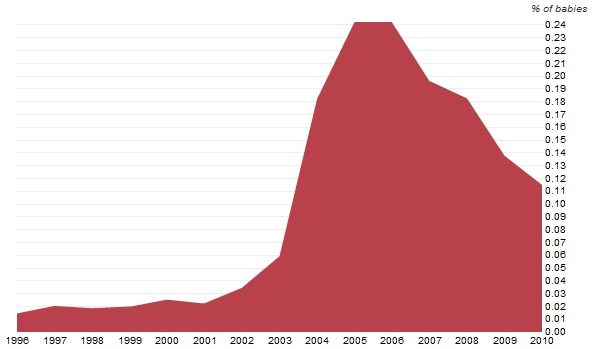 Trends for Keira since 1996 |
 Trends for Jude since 1996 |
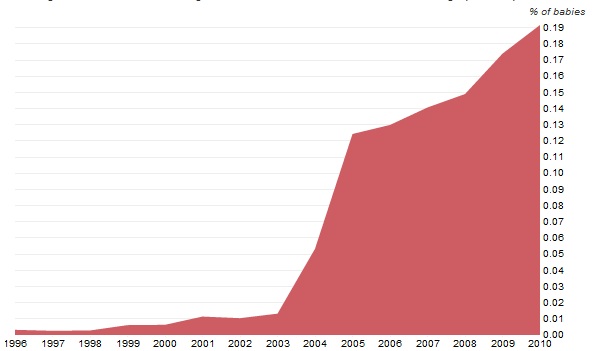 Trends for Sienna since 1996 |
Celebrities’ children are a big influence: thus Rocco (Madonna’s son), and Lyla (a derivation of Lila, Kate Moss’s daughter) both appear on the top-10 fastest-rising names. Brooklyn (Beckham) was the fastest-rising boy’s name in the first five years of the period, between 1996 and 2001, and is still on the up.
Not all celebrity names catch on, though: even a beautiful, famous, and multi-talented owner can’t popularise a truly terrible name. Sorry, Nigella.
Incidentally, I don’t think we can assume parents always name their babies “after” a particular celebrity: Myla first rose to fame as the name of an expensive lingerie brand, but has still clearly inspired many parents (79 babies in 2010), who presumably aren’t deliberately naming their daughters after posh pants.
You’re toxic, baby
Some names, like Jordan, are chiefly notable for falling out of fashion over the period. Most striking is Britney, who explodes into fame in 1999 and almost as swiftly falls from favour again (killing the previously-popular name Brittany in the process). Courtney also drags down Courteney. Unsurprisingly, both Usama and Osama fall sharply in popularity after 2001.
Sometimes, celebrities just get less famous. For boys, a big hero-to-zero is early-90s child star Macaulay. And Lauryn Hill’s career never recovered after the late 1990s.
This sporting life
Sporting names, delightfully, seem to mirror their owners’ careers even more precisely than celebrity names. Jenson (the second fastest-rising name over the whole period) is a case in point. It first gains traction in 2000 (when Jenson Button became Britain’s youngest-ever F1 driver), zooms ahead in 2004 when he finished in the rankings for the first time, falls back again, then races up in 2009, when he won the World Drivers’ Championship.
I also noticed this being true of Thierry (peaking at 51 babies in 2004, when he was Europe’s top goalscorer) and Rio (peaking at 355 babies in 2008, when United won the double).
 Trends for Jenson since 1996 |
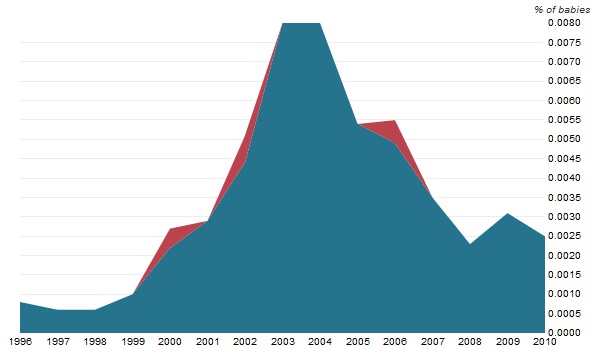 Trends for Thierry since 1996 |
 Trends for Rio since 1996 |
Royalty on the rise
Perhaps surprisingly, the young royals’ names William, Harry, Zara and Beatrice are all steadily on the up since 1996 – indeed, Harry is now the 3rd most popular boys’ name, up from 17th in 1996. No sign of a Kate/Catherine bump yet, though.
Political poison
Political names almost invariably seem to have negative, if any, effects. There’s a significant drop in the name Cameron in recent years, and from a lower base, Blair post 1997. And Cherie has collapsed as a girls’ name. I only spotted one political exception (it might be influenced by the rise in Polish names, but still): Boris, slowly but surely on the rise.
 Trends for Cameron since 1996 |
 Trends for Blair since 1996 |
 Trends for Boris since 1996 |
Eastern Europe
The ONS data doesn’t include ethnicity, but if you browse the site for any length of time, you’ll spot a big jump in Eastern European names following the expansion of the EU in 2005. This probably accounts for Filip, Kacper and Zuzanna being in the top-10 lists (though they still account for small numbers of babies overall.)
I think the archtypal British name of recent years may be Jakub, the fifth fastest-rising boys’ name from 1996 to 2010, and the fastest-rising Polish name. Not only is it Polish, it is also a famous footballer’s name (Borussia Dortmund star Jakub Blaszczykowski).
Art and culture
On the list above, Amelie (the second fastest-rising girls’ name over the whole period) is probably the biggest fictional influence, becoming popular after the 2001 film of the same name. The Matrix is also a big film influence in the late 1990s – both Neo (boys) and Trinity (girls) made it into the top-10 fastest-rising names between 1996 and 2001.
From the book world, a notable new name is Lyra, which Philip Pullman invented for His Dark Materials, and inspired a whopping 152 sets of parents in 2009. And I’m not sure this counts as either art or culture, but Chardonnay (in various different spellings, from Chardenay to Chardae to Chardonnai) explodes in popularity after Footballers’ Wives.
And you don’t have to be a pop star or a sporting hero to popularise a name: the fastest-rising boy’s name between 2006 and 2010 was Grayson. The only famous Grayson I know is the ceramicist Grayson Perry. So you can be an artist too.
 Trends for Trinity since 1996 |
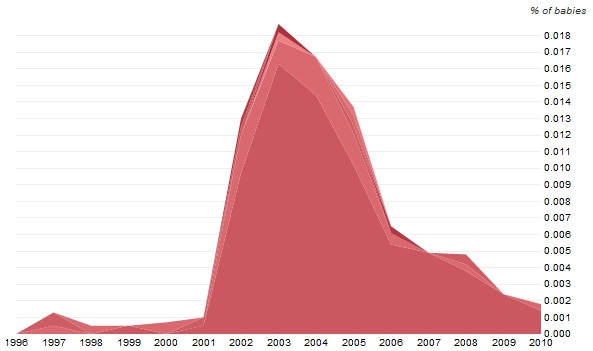 Trends for Chard- since 1996 |
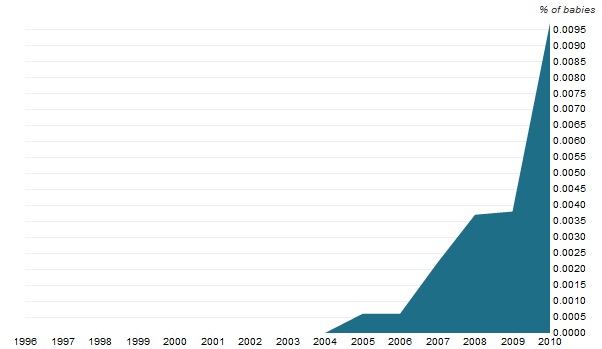 Trends for Grayson since 1996 |
Finally, we began choosing more unusual names during the last decade and a half. In 1996, the ONS reported 8,671 unique names for 649,488 babies, or roughly 74 babies for each name. By 2010, this had risen to 13,421 unique names for 723,165 babies, or roughly 55 babies for each name. (The ONS does not report names only given to 1 or 2 babies in a year, so a mathematician wouldn’t regard this as proof, but the overall trend is clear.)
And parents consistently show more variety when naming their daughters than their sons. In 2010, there were 7,388 unique names for 352,248 girl babies, but just 6,033 unique names for 370,917 boy babies.
What trends have I missed? Let me know in the comments.
A note on colour: I really wanted to avoid using pink for female names. I tried green and purple, but the visual contrast was poor, and early testers found it confusing. So I used relatively un-girly dark-red pink. Sorry, pink haters.
Try looking for your own name on the site: England & Wales Baby Names. If you want to do your own analysis, please see the ONS raw data, or my aggregated dataset (reproduced under the Open Government Licence), and check out the script I used to identify trends.
The rise of Harry could also be due to Harry Potter…
Oh yes, good point. There’s a jump for Hermione, too.
I would imagine a certain Harry Styles from one direction is something to do with this too!
“Names with a count of 2 or less have been redacted using S40 of the Freedom of Information Act in order to protect the confidentiality of individuals.”
Explains why my son’s name isn’t there!
Something I’ve wondered about when looking at this data before is spelling variants. Has the rate of variation changed much?
A related point might be hyphenated vs. middle names, especially for girls. I wish the ONS captured full names – we can see the rise of Lily-Rose and Emma-May, but we’ll never know about Lily Rose and Emma May…
Thanks for building the app!
Anna, this is fascinating, and expertly designed too. The big trend I’ve seen since I was at school in the 80s is the rise and rise in double-barrelled names, particularly for girls. And the same second part so often appears: Mae, Grace, Lou, Rose, etc.
In 15 years there were only 6 girls named Mavis and they were all born in 2006, I wonder why. Can’t think of a Mavis other than from Coronation Street and I’m not sure she would have influenced naming….
….and 4 Gerties all born in 2008……
Very interesting, although my friend’s son Morri was born in 2004 and the data doesn’t even list his name.
Thanks for all the comments!
@Emma – the ONS only records names that are given to at least three babies in a year, so that’s probably why Morri doesn’t appear. Clearly a very unusual name.
@Ned and @Trinder – spelling variations are really interesting. I don’t know how you’d analyse them en masse, though.
However, you can see here that the proportion of names that are double-barrelled has trebled since 1996: http://names.darkgreener.com/#.*-
I checked my sons name, Dexter. Funnily enough, the popularity significantly increased when the HBO series “Dexter” (an anti-hero serial killer) started in 2006…
I was wondering if it was possible for you do the scottish data? I haven’t been able to find any data on naming trends in Scotland and would really like to see what the changes and popular names are up here
This is fascinating stuff. I can’t imagine how it happens that nobody gives anyone the name Ethel (to take my mother-in-law’s as an example) for years on end, and then all of a sudden there are six of them.
I suppose if names only given to one child in a year don’t show up, there may be a steady annual Etheling which doesn’t get on the radar. It also explains why my two grand-daughters’ unique Anglo-Kenyan names don’t show up.
love the website and the visualisation but there may be a problem with the dataset! My daughter Germaine was born in Jan 1998 but according to this there were no Germaines registered that year???????
Durr! Now just read the other comments and it makes sense now, but really, redacted under FIO?
Anna makes a valid point on scottish data. My eldest is called Tavis and I know of no one else of that name. The only time I heard it was on Blackadder although it wasn’t that that prompted us to name him that.
Thanks, very interesting. Local variations are interesting too, I think. I see your assessment that biblical boys’ names are unfashionable but at my son’s nursery there is a Solomon (my son), a Jonah, a Joseph and 2 Samuels…all in the same town and aged less than 2! I also know a couple of Noahs, though they live about 3 miles away….
The whole discussion about double names is kind of funny to me.
Where I come from, a double first name (Lily-Rose or Lily Rose, Billy Joe or BillieJo) meant that you were poor white trash.
Then again, the rich girls were all named after porn stars (Brittney, Amber, Sienna)…
This tool is so useful and really well done – thanks so much – can’t believe you’ve not monetised it somehow as there are whole massive discussion boards dedicated to names in all the baby forums – you could probably be raking it in!!
Excellent post!!
I would be grateful indeed if you’d allow me to summarize a bit your post in my website, including a link to yours.
Thanks a lot
Ena
This is a lovely piece of work, and completely fascinating. Thank you.
A very nice tool, which we played with a lot before choosing a name. Thank you for putting it up and keeping it up.
Can I make a couple of feature requests, that would make it even better if you ever revisit the code? It tends to start hunting for names before I have finished typing my search string. Particularly if I’m attempting to get a regexp right this is frustrating, as pulling up every name beginning with A, say, takes a bit of time and typing focus gets lost. The workaround is to type directly into the URL, but a way to stop the tool from running until you’ve pressed Return would be better.
Also, a radio button to select display of results for boys/girls/either would increase the density of useful information in some obvious use cases!